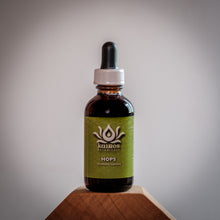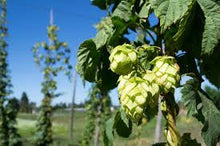Long associated with relieving anxiety, inducing relaxation and sleep, hops also have anti-inflammatory and anti-microbial properties. Flowers also contain estrogen like chemicals which may be beneficial for medical conditions associated with hormonal changes.
**(Note – Avoid use during pregnancy).
Made from fresh hop flower.
Bottle: 50ml
-----------------------------------
Would you like to know more? Below you can find an excerpt from our book "Medicinal Perennials to Know and Grow"
Hops are the female flowers, also called the strobiles, of the hop plant. They are the part of the plant, brewed as tea, which is so effective for insomnia, anxiety, restlessness and nervousness. It is hard to believe that hops tea can bestow such a beautiful night’s sleep while the hop plant is such an incredibly energetic grower, often reaching over 25 feet in a season.
Hops are commonly known as a bittering, flavouring and stability agent in beer. What is not so commonly known is that a lot of the relaxing feeling you get from drinking beer is not only from the alcohol content but also from the hops.
The hop has male and female flowers on separate plants. The male flowers are in loose bunches or panicles, while the female ones are in leafy, cone-like catkins, as in Lyn Alice’s illustration. Thus, female plants are the ones usually sold at nurseries. The hop plant is not usually propagated by seed but by dividing the young shoots from the main crown in spring or by rooting cuttings from the older shoots and suckers in late summer.
Hops prefer a deeply dug, rich, moist soil with full sun. Although they are so vigorous, they can easily be trained over a chicken wire fence or trellis to hang down at optimum harvesting height. Pick the strobiles in early fall when they are turning an amber colour. Dry them on screens or trays in a greenhouse until they become papery dry and then store them in a cool dark place for those times when you need to calm down.
Just three or four strobiles simmered in a cup of water for five minutes before straining will give the desired effect for most people. However, you should experiment with doses to see what works best for you.
No side effects, contraindications or adverse drug indications from the use of hops are known. However, they do contain estrogen-like chemicals, which may be beneficial for conditions associated with hormonal changes but probably should be avoided during pregnancy.






